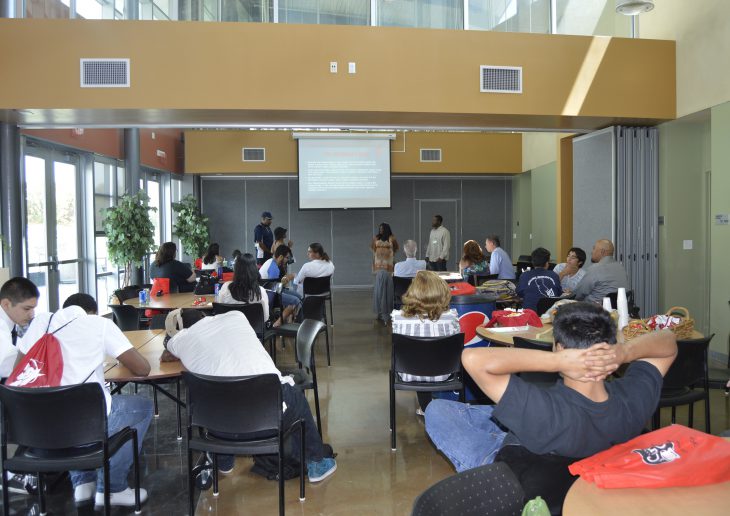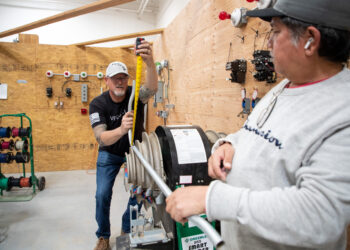
Culinary careers are sizzling again as the hospitality and restaurant industry bounces back from the pandemic and seeks to fill the positions vacated during the COVID-19 downturn. Chaffey College is doing its part to get more cooks in the kitchen.

Riverside and San Bernardino Counties combine to create what is among the fastest-growing regions in California, and small businesses are a major factor in driving the economy. Census data shows that more than 80 percent of companies across the Inland Empire have fewer than 20 employees, and a large chunk of those businesses consist of the self-employed.
In fact, as recently as 2015, Riverside/San Bernardino was ranked the best metropolitan location in the nation to launch a small business. In a survey analyzing 12,000 businesses with fewer than 250 employees, New York-based online lending platform Biz2Credit concluded that the area was a hotbed for IT, advanced manufacturing, food processing, health and medicine, and professional services. The survey discovered that small businesses in the Inland Empire had average annual revenues of more than $1.4 million. The Inland Empire continues to lead the way in this regards, ranking No. 10 nationwide in the 2017 survey, ahead of such entrepreneurial flashpoints as San Diego, Houston, San Antonio, Charlotte, and Las Vegas.
“We’re seeing a turnaround in the economy, and people are not as reluctant to jump in and do their own thing,” said Lisa Kiplinger-Kennedy, who, as deputy sector navigator for business and entrepreneurship in the Inland Empire and Desert region, works with community colleges to coordinate programs that provide prospective business owners the tools they need to succeed.
Adam Spitz is among the those who have benefitted from such programs. The owner of Ultimate Motors in Yucca Valley, which specializes in vehicle repair and servicing, said the lessons he took from career education courses at Copper Mountain College were vital.
“These programs are affordable, they’re convenient, and they’re run by people who are working in the industry,” said Spitz, who employs nine people.
There are plenty of programs to choose from. And what’s not to like? Tax preparers and bookkeepers working for smaller firms in the region are earning an average annual salary of more than $42,000 per year, according to a 2017 report prepared by the Centers of Excellence. Agencies, brokerages and other insurance-related positions are earning close to $60,000 each year, with building equipment contractors making more than $60,000, on average.
Among the more popular small business-related career education programs in the Inland Empire/Desert region: real estate; retail management; accounting, tax preparation and financial planning; management, supervision and production management; and marketing, among other professions.
Of course, one person’s definition of a small business may not be the same as another’s. The U.S. Small Business Administration has defined a small business as having no more than 500 employees, for most manufacturing and mining industries, and no more than $7.5 million in average annual receipts for many non-manufacturing industries. But most small businesses in the Inland Empire and Desert region are much smaller.
In the Inland Empire area of the two-county region, 15 percent of small businesses are owner- operated, or a self-proprietorship, according to a questionnaire completed by 406 small business owners or managers. Nearly half of these businesses employed between one and 10 people. Just 17 percent had a workforce of 50 or more. Likewise, in the high and low desert areas, 15 percent of small businesses are owner-operated, or a self-proprietorship, according to questionnaire completed by 225 small businesses. Just three percent employed a workforce of more than 50.
Just one-third of new businesses survive their first year, and only half survive at least five years. Thus, community colleges are broadening their services to help entrepreneurs plan and launch their business endeavors. Efforts include developing incubators and “makerspaces” at campuses throughout the two-county region to expand students’ entrepreneurial skills.
“A lot of people will have a skill and think that’s enough to start a business, without understanding what it takes to run it, such as the marketing, advertising, and management that’s involved,” said Kiplinger-Kennedy, whose businesses over the past quarter-century include a medical device company and an in-home wine-tasting firm. “You have to be ready to get out of your comfort zone and you have to be willing to take a leap of faith. You’re not working for anyone, so you’re not getting a paycheck every two weeks, there are no benefits, and when you take time off you’re not getting paid. It’s great to work for yourself and gain that freedom, but that freedom does come with a cost.”
To help prospective business owners network, the Inland Empire/Desert Regional Consortium of community colleges has partnered with the Collegiate Entrepreneur Organization to revive entrepreneur clubs at all 12 campuses in the area. Guest speakers, entrepreneur-themed movie nights, and trips to local business incubators and co-working spaces are among the services provided.
“Being an entrepreneur and opening your own business takes preparation,” Kiplinger-Kennedy said. “And the Inland Empire/Desert Regional Consortium is here to help you be prepared.”

Culinary careers are sizzling again as the hospitality and restaurant industry bounces back from the pandemic and seeks to fill the positions vacated during the COVID-19 downturn. Chaffey College is doing its part to get more cooks in the kitchen.

Dual Enrollment (DE) is catching on as students and their families recognize the advantages of earning college credit while still working towards high school graduation. But students aren’t the only… Read More – Good News for Community Colleges: Dual Enrollments Are on the Rise

Enrollment in courses not offering credit toward a degree or certificate are outpacing for-credit programs in some states (Fed Communities). And it’s no wonder. With the convenience, minimal time commitment,… Read More – No Credit, No Problem: Noncredit Courses Gain Steam